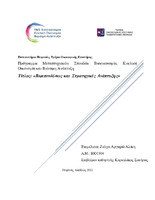Βιοεπενδύσεις και στρατηγικές ανάπτυξης

Προβολή/
Λέξεις κλειδιά
Βιοοικονομία ; Βιοενέργεια ; Δάση ; Επενδύσεις ; Ευρωπαϊκή ΈνωσηΠερίληψη
Στην παρούσα διπλωματική εργασία, θα μελετηθούν οι στρατηγικές ανάπτυξης των χωρών της Ευρωπαϊκής Ένωσης στο πλαίσιο της βιοοικονομίας και της βιώσιμης ανάπτυξης υπό το πρίσμα των πράσινων επενδύσεων που πραγματοποιούνται σε αυτές. Η βιοοικονομία μπορεί να οριστεί ως «η παραγωγή και χρήση βιολογικών πόρων, οι βιολογικές διεργασίες και οι αρχές για τη βιώσιμη παραγωγή αγαθών και υπηρεσιών σε όλους τους τομείς της οικονομίας». Βασίζεται σε τρεις πυλώνες όπως η χρήση ανανεώσιμης βιομάζας και αποδοτικών διεργασιών με στόχο τη βιώσιμη παραγωγή αγαθών, η αξιοποίηση των τεχνολογιών καθώς και των βιοτεχνολογικών μεθόδων, και τέλος, η εφαρμογή των βιώσιμων πρακτικών στους τομείς της γεωργίας, της υγείας και της βιομηχανίας. Η βιοοικονομία αναπτύσσεται με ραγδαίο ρυθμό παράλληλα με την αύξηση του πληθυσμού του πλανήτη, των φαινομένων που οφείλονται στην κλιματική αλλαγή, την ασφάλεια των τροφίμων και την εξάντληση των μη ανανεώσιμων πόρων, και αποτελεί εργαλείο για τη βιώσιμη ανάπτυξη της οικονομίας των χωρών και τη δημιουργία νέων θέσεων εργασίας.
Η βιοοικονομία έχει υιοθετηθεί από πληθώρα χώρες του κόσμου ως μια νέα προοπτική ανάπτυξης, έχοντας ως κύριο στόχο την επίτευξη των Στόχων Βιώσιμης Ανάπτυξης (ΣΒΑ) που έχει θεσπίσει ο Οργανισμός των Ηνωμένων Εθνών, καθώς και τη συμφωνία των Παρισίων για την Κλιματική Αλλαγή.
Στην παρούσα εργασία θα μελετηθούν οι στρατηγικές και οι πρακτικές που ακολουθούν έξι χώρες της Ευρωπαϊκής Ένωσης (Γαλλία, Γερμανία, Ελλάδα, Ιταλία, Ολλανδία, Ισπανία) με στόχο την ανάπτυξή τους στον τομέα της βιοοικονομίας, της παραγωγής ηλεκτρικής ενέργειας από βιομάζα και των δασών.


